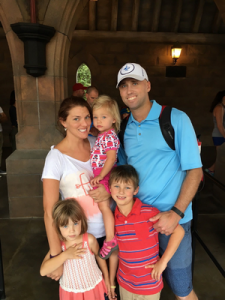No one was there for me when I needed them! How many times have you heard or said this? When the Apostle Paul was in prison and his friends in Philippi weren’t there for him, you have to wonder if he was tempted to feel this way. If you were in prison, especially for a just cause, I imagine you’d expect your friends to be there for you. It seems like the time you’d need them the most! If they didn’t come through for you, you’d likely feel let down and like they must not have really cared about you. Paul shows us a different way to respond, though.
Who do you expect to be there for you in your time of need? Have you ever wondered if your expectations were realistic? What if some people that you’re counting on aren’t actually there for you to rely on, but rather for you to be a light to them!? Or maybe you are relying on reliable people, but just in an unreliable season of their life. We all have those, no?
Our mission at Inheritance of Hope is to serve families who are fighting a terminal illness. I think they certainly fall into the category of reliable people in an unreliable season. In those obvious seasons, though, we would never doubt that they would be there for us if they could! That was the same with Paul’s friends in Philippi. If they could have, they would have, but they simply could not help him. They weren’t in a position to, and he knew it, but never doubted their heart.
I wonder if there are some less obvious cases in our lives of misplaced reliance, that turned into resentment? Can you think of anyone you became bitter towards because they weren’t “there for you”? Did you ever stop to wonder what was going on in their life at the time? Maybe they couldn’t be there.
Another thing I think is worth examining is our “need.” What is it that we actually “need” others to do for us? Could we possibly be expecting the wrong people to fulfill the wrong needs at the wrong time? Do we need attention? Validation? Or maybe acceptance? If so, I’ll agree that those are all valid and fundamental human needs, but if it’s another person you’re expecting to meet them, you’re only setting yourself up for disappointment because regardless of how great they are, they’re still imperfect and bound to let you down.
The last devotion I gave was on Philippians 4:11 and the secret of contentment. Today’s devotion is based on the verse right before it, Philippians 4:10, which was easier to skip over but I think it is very revealing about Paul’s attitude. After finally receiving some care from his friends in Philippi, Paul says this: “But I rejoiced in the Lord greatly that now at last your care for me has flourished again; though you surely did care, but you lacked opportunity.”
That verse spoke to me, because my first thought would probably be something like, “Oh you wanna show up now?!” Instead of resorting to bitterness for the time they weren’t there, though, Paul chooses to be grateful that they are there now!
Paul recognizes two important things, that I think helps him have this attitude. One, the only reason his friends weren’t there in the first place was that they couldn’t be; it had nothing to do with them wanting to be. He never doubted that they cared about him.
Two, he recognizes that he doesn’t actually even need their care. In the next verse, Paul says, “Not that I speak in regard to need,” and in verse 19 he explains that it’s God who shall supply all our needs. Even so, he still lets his gratitude be known and encourages them for their generosity, as in verse 14 when he says, “Nevertheless you have done well that you shared in my distress.” So because Paul understands the situation, is relying on God and not his friends, and recognizes that only God can fulfill his needs, he is able to be grateful for any generosity extended to him, recognizing he’s not entitled to it.
So to bring it in, all of us at some point have felt let down by someone because we expected them to be there for us and they weren’t. We know we have needs that need to be filled, and if we’re honest, sometimes we look to other people to fill them. Paul knew his friends could not fill his needs, so he did not expect them to, but was extremely grateful when they extended their care.
If we can learn to recognize that people aren’t here to satisfy our needs, then we can also stop expecting them to. Then, when God uses someone in our life to meet a need, we can be grateful that He did and content in the understanding that He will supply all our needs, according to His riches and glory by Christ Jesus (Philippians 4:19).
Dillon is Inheritance of Hope’s Technology Manager. A version of this devotional was first shared with the April 2020 eLegacy Retreat team.



